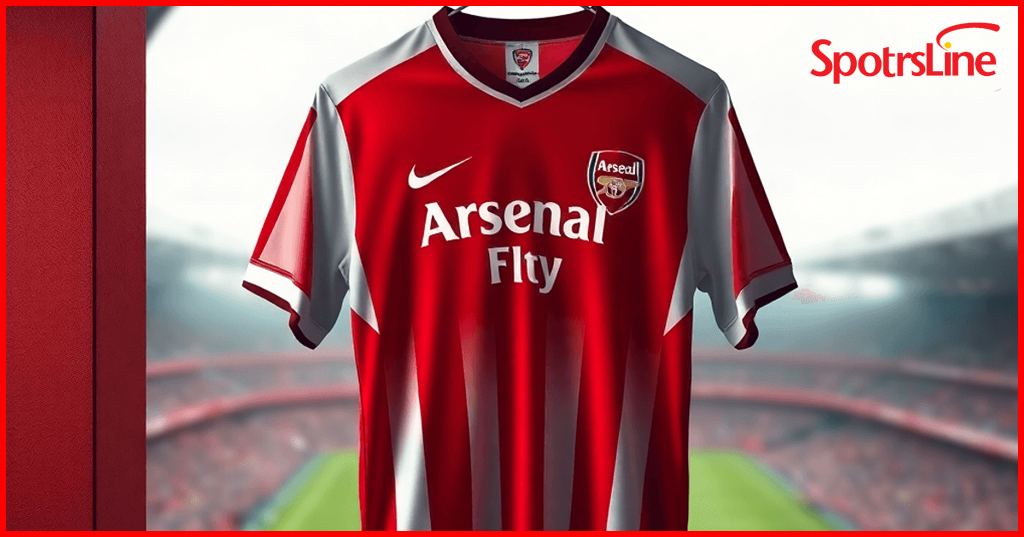
The Importance of Arsenal Jersey in Sports Culture
Arsenal’s iconic red and white Arsenal Jersey stands as a powerful symbol in football history, representing more than just team colors. Since the club’s founding in 1886, these jerseys have become cultural artifacts that tell stories of triumph, innovation, and community spirit.
A Symbol of Identity
The Arsenal jersey serves as a badge of identity for millions of supporters worldwide. Each design carries deep meaning:
- The classic red body with white sleeves dates back to 1933
- The iconic cannon emblem represents the club’s military origins
- Special edition kits celebrate the club’s diverse fanbase
A History of Success
Arsenal’s achievements shine through their jersey history. The club has claimed 13 league titles and a record 14 FA Cups, with legendary players like Thierry Henry and Dennis Bergkamp wearing these colors with pride. The 2003-04 “Invincibles” season saw the team go undefeated in their distinctive redcurrant commemorative kit.
Reflecting Social Progress
Beyond statistics, Arsenal jersey reflect social progress. The club pioneered diversity in English football, breaking barriers and creating inclusive spaces for fans and players alike. Each new kit design pays homage to this legacy while pushing creative boundaries.

Connecting Generations
In London’s sporting landscape, the Arsenal jersey represents belonging. From the marble halls of Highbury to the modern Emirates Stadium, these shirts connect generations of supporters through shared passion and pride.
Embracing Diversity: Arsenal’s Commitment to Black Representation in Football
On September 14, 2002, Arsenal Football Club made history in the Premier League. In their match against Southampton, the starting lineup included nine Black players – a remarkable achievement that broke down barriers in English football. This moment showcased Arsenal’s commitment to valuing talent regardless of race, setting a new standard for diversity in professional sports.
The Historic Lineup
The groundbreaking lineup consisted of:
- Lauren
- Ashley Cole
- Sol Campbell
- Patrick Vieira
- Sylvain Wiltord
- Thierry Henry
- Kolo Toure
- Nwankwo Kanu
- Lauren
This pivotal moment sparked important discussions about representation in football. The club’s jerseys became powerful symbols of unity, worn with pride by players who defied racial boundaries and inspired future generations.
Beyond Player Selection
Arsenal’s dedication to diversity goes beyond just choosing players. The club actively promotes Black culture through their jersey designs and community initiatives. The Black Arsenal project, documented in Dr. Clive Chijioke Nwonka’s book, highlights the significant contributions the club has made to Black cultural history. Such efforts align with broader trends in sports where cultural diversity plays a crucial role, promoting inclusion and representation.
Impact at the Emirates Stadium
The effects of this representation can be seen at the Emirates Stadium, where an increasing number of Black female fans attend matches. This growing diversity in the stands reflects the club’s inclusive philosophy on the field.
Cultural Significance of Jerseys
Arsenal’s jerseys hold cultural significance, telling stories of progress and change. Each kit worn by Black players symbolizes numerous barriers broken and stereotypes challenged. The club’s commitment to diversity has opened doors for talented players who may have been overlooked in earlier times.
Legacy of the 2002 Lineup
The legacy of the 2002 lineup continues through Arsenal’s ongoing dedication to representation. Their jerseys serve as symbols of progress, reminding both fans and players that football knows no racial boundaries. This commitment has played a role in shaping a more inclusive Premier League, where talent and skill determine success. Additionally, similar efforts are being recognized at institutions like the National Museum of African American History and Culture, which showcases the significant impact of sports in promoting diversity and representation.
Cultural Expression Through Design: The 2024 Away Kit
Arsenal’s 2024 away kit is more than just a uniform; it’s a powerful statement of cultural heritage. Designed by Sierra Leone-born creative director Foday Dumbuya of Labrum, the kit showcases the club’s deep connection to African culture and its commitment to celebrating diversity.
Distinctive Features of the Jersey
The jersey’s design is filled with symbolism and meaning, reflecting the stories and experiences of African communities. Here are some of its key features:
- Migration Paths: The black and white zigzag patterns represent the migration routes taken by African communities to the UK during the 1920s.
- Pan-African Inspiration: The colors used in the kit – red, black, and green – are inspired by the Pan-African flag, symbolizing unity, strength, and growth.
- Traditional Art Forms: Custom typography has been incorporated into the design, drawing inspiration from traditional African art forms.
- Textile Homage: Subtle geometric patterns pay tribute to West African textile designs, adding another layer of cultural significance.
Authenticity Through Collaboration
The collaboration with Dumbuya brings authenticity to the design process. His personal experience as part of the African diaspora adds depth to each design element. The zigzag motif serves as a visual narrative of journey and transformation, while the bold color choices make a statement about identity and pride.
Beyond Aesthetics: Opening Dialogues
This Arsenal Jersey design goes beyond being visually appealing – it sparks conversations about Arsenal’s historical connections to African football and its fanbase. The jersey becomes a wearable piece of art that tells stories of migration, community, and cultural exchange.
Attention to Detail: Function Meets Symbolism
The Arsenal Jersey design team’s meticulousness extends beyond just aesthetics. They have carefully selected fabrics and manufacturing processes that ensure the kit meets professional performance standards while still honoring its cultural inspiration. Every stitch and pattern placement has been thoughtfully considered to create a seamless blend of function and symbolism.
A Milestone in Sports Apparel Design
Arsenal’s 2024 away kit represents a significant milestone in sports apparel design, where cultural expression intertwines with athletic performance. It serves as a testament to the club’s understanding that football is more than just a game – it’s an opportunity to celebrate heritage and promote inclusivity through intentional design choices.
Arsène Wenger’s Legacy: Nurturing African Talent at Arsenal
Arsène Wenger’s 22-year reign at Arsenal transformed the club’s approach to talent development, particularly in nurturing African players. His deep understanding of African football stemmed from his early managerial days at AS Nancy, where he developed connections with football academies across the continent.
Wenger’s Impact on African Players at Arsenal
Under Wenger’s guidance, Arsenal became a beacon for African talent:
- Kanu Nwankwo – The Nigerian striker’s technical brilliance redefined the perception of African players in English football
- Lauren – Cameroon’s defensive stalwart brought resilience and versatility to the Invincibles squad
- Emmanuel Eboué – The Ivorian defender emerged as a fan favorite through his passionate displays
- Emmanuel Adebayor – The Togolese striker’s goal-scoring prowess highlighted Wenger’s eye for raw talent
The Significance of the 2003-04 Invincibles Season
The 2003-04 Invincibles season stands as a testament to Wenger’s multicultural vision. The team’s success wasn’t just about remaining unbeaten – it demonstrated how diverse talents could blend into an unstoppable force. African players wearing the Arsenal jersey became symbols of excellence, inspiring countless young talents across the continent.
Wenger’s Lasting Impact on Future Generations
Wenger’s legacy extends beyond trophies. His commitment to developing African talent created pathways for future generations. The Arsenal jersey became a symbol of opportunity, representing a club where skill and potential transcended geographical boundaries.
This philosophy reshaped Arsenal’s scouting networks and youth development programs. The club established partnerships with African academies, creating sustainable pipelines for emerging talent. Players donning the Arsenal jersey weren’t just representing a club – they were carrying the hopes of their nations and inspiring future generations.
Continuing Influence on Arsenal’s Recruitment Strategy
The impact of Wenger’s approach continues to influence Arsenal’s recruitment strategy. His emphasis on technical ability, intelligence, and character remains central to the club’s talent identification process, particularly when scouting in Africa.
This deep connection between Arsenal and Africa is evident in the substantial fan base the club enjoys on the continent. Despite recent struggles on the pitch, Arsenal still retains a special place in the hearts of many African football fans. Wenger’s influence has not only changed the landscape of English football but has also left an indelible mark on the Premier League as a whole, reshaping its dynamics in ways that are still felt today.
Current Trends and Initiatives: Celebrating African Heritage at Arsenal
Arsenal is committed to celebrating African heritage through innovative designs and community-driven initiatives. This commitment is exemplified by the club’s 2024 away kit, which features a groundbreaking collaboration with Sierra Leone-born designer Foday Dumbuya of Labrum London.
Design Elements of the Kit
The Arsenal Jersey design elements of the kit convey powerful messages:
- The colors are inspired by the Pan-African flag.
- The black and white zigzag patterns represent migration stories.
- The custom typography reflects African artistic traditions.
Community Engagement Programs
Arsenal’s community engagement efforts go beyond jersey designs. The club has launched several programs that celebrate African culture:
- African Art Series at Emirates Stadium
- Regular meet-and-greets between African Arsenal legends and young fans
- Cultural exchange programs connecting London-based supporters with fan groups across Africa

Partnership with Rwanda
The club’s partnership with Rwanda through the “Visit Rwanda” initiative is a significant step in strengthening ties with the African continent. This collaboration goes beyond traditional sponsorship by including:
- Investment in Rwandan football development
- Cultural exchange programs
- Support for local communities
Retail Spaces and Merchandise
Arsenal’s retail spaces now feature dedicated sections for Africa-inspired merchandise, designed by African artists and creators. These products include:
- Limited edition scarves with traditional African patterns
- Collaborative streetwear collections
- Custom accessories celebrating African heritage
Digital Presence and Supporter Stories
The club’s social media channels regularly spotlight African supporters’ stories, creating a digital bridge between continents. This digital presence has fostered a vibrant online community where fans share their personal connections to both Arsenal and their African heritage.
Through these initiatives, Arsenal continues to strengthen its bond with African culture, creating meaningful connections that resonate both on and off the pitch. Moreover, these efforts align with broader initiatives such as the Agenda 2063, which aims to accelerate the socio-economic transformation of Africa.
Players as Cultural Icons: Bukayo Saka and Cross-Cultural Appeal in Football
Bukayo Saka is an inspiration in modern football, breaking barriers to become a cultural icon. His influence goes beyond his impressive performances on the field, reaching diverse communities worldwide.
A Multicultural Role Model
Saka’s story resonates with young players from different backgrounds. He grew up in London with Nigerian parents and worked his way up from Arsenal’s academy to become a key player for both club and country. At just 22 years old, he has already achieved:
- Being named England Men’s Player of the Year in 2023
- Being nominated for Premier League Young Player of the Season
- Starting regularly for Arsenal and the England national team
Inspiring Future Generations
Saka’s impact extends beyond football. His down-to-earth personality and exceptional skills make him an approachable role model for aspiring athletes. Young fans connect with his authenticity, whether it’s through his heartfelt interviews or his pride in representing both England and Nigeria.
Celebrating Cultural Diversity
Saka’s presence in professional football represents a new wave of players who embrace their cultural identities while excelling in their sport. This celebration of cultural diversity sends a message to clubs about the importance of supporting talent from diverse backgrounds and creating inclusive environments.
Grassroots Impact
Local communities have seen more young people getting involved in football, with many citing Saka as their motivation. Football academies are also experiencing increased interest from minority groups, thanks to role models like him who show that anyone can achieve their dreams regardless of where they come from.
Uniting Fans through Authenticity
Saka’s popularity among Arsenal supporters demonstrates how genuine representation can resonate across cultures. His jersey has become one of the club’s top sellers, worn proudly by fans from all walks of life as a symbol of togetherness and love for the game. This unity is further reflected in the diverse fanbase that supports him, showcasing the power of sports to transcend cultural boundaries.
Moreover, Saka’s journey also highlights the importance of grassroots initiatives in fostering talent from underrepresented communities. His story is a testament to how photography can capture these moments and inspire future generations to pursue their dreams in sports, regardless of their background.
Addressing Challenges Within Sports Culture: Racism and Its Impact on Black Players
The fight against racism remains a pressing challenge in football, with Black players facing discrimination through social media abuse, stadium incidents, and systemic barriers. Recent statistics from Kick It Out reveal a 41% increase in reported racist incidents during the 2022/23 season, highlighting the persistent nature of this issue.
Arsenal’s Stance Against Racism
Arsenal’s stance against racism manifests through their No Room for Racism campaign, utilizing their jersey platform to amplify anti-discrimination messages. The club’s response to racist incidents includes:
- Immediate stadium bans for offenders
- Educational programs for supporters
- Active support for players facing discrimination
- Collaboration with anti-racism organizations
Psychological Burden on Black Players
Black players often bear additional psychological burdens while performing at elite levels. Research by the Professional Footballers’ Association indicates that 43% of Black players have experienced racial abuse during their careers, impacting their mental health and performance.
Symbolism of Arsenal’s Jersey
Arsenal’s jersey serves as a powerful symbol of unity and resistance against racism. The club’s initiatives include:
- Pre-match warm-up shirts featuring anti-racism messages
- Dedicated match days celebrating diversity
- Social media campaigns amplifying player voices
- Community outreach programs targeting youth education
Protecting Players from Racism
The club’s response to racist incidents demonstrates their commitment to protecting players. When Arsenal midfielder Eddie Nketiah faced online abuse, the club’s swift action included:
“We stand with you, Eddie. We’re proud of our diversity and we’ll continue working with our players, fans, and football authorities to eradicate racism from our game.”
These challenges underscore the importance of sustained action. Arsenal’s jersey represents more than team colors – it embodies a commitment to creating an inclusive environment where talent thrives regardless of racial background. The club’s proactive approach sets standards for addressing racism through visible platforms and concrete actions.
Addressing Challenges Within Sports Culture: Racism and Its Impact on Black Players
The fight against racism in football remains an ongoing battle, with Black players continuing to face discrimination both on and off the pitch. Arsenal’s platform as a leading football club positions them uniquely to address these challenges head-on.
Key Areas of Impact:
- Social media abuse targeting Black players
- Discriminatory chants from opposing fans
- Systemic barriers in coaching and management roles
- Microaggressions within club structures
The club has implemented several initiatives to combat these issues:
- Zero-tolerance policies at the Emirates Stadium
- Educational programs for staff and supporters
- Support systems for players facing discrimination
- Partnerships with anti-racism organizations
Arsenal’s commitment extends beyond symbolic gestures. The club actively works to create meaningful change through:
- Mentorship programs for young Black players
- Diversity training for academy staff
- Community outreach initiatives
- Regular dialogue with supporter groups
These efforts demonstrate Arsenal’s dedication to creating a more inclusive environment in football. The club’s stance serves as a model for other teams, showing how sports organizations can use their influence to drive positive social change.
The journey toward eliminating racism in football isn’t complete, but Arsenal’s proactive approach sets a standard for addressing these challenges within sports culture. Their efforts prove that clubs can be powerful agents of change in the fight against discrimination.
FAQs (Frequently Asked Questions)
What is the cultural significance of Arsenal jerseys?
Arsenal jerseys hold a significant place in sports culture as they represent the identity and history of Arsenal Football Club. They are symbols of loyalty, pride, and community among fans, embodying the club’s rich heritage and achievements.
How has Arsenal contributed to Black representation in football?
Arsenal has made notable strides in promoting diversity through their jerseys and team composition. The historic 2002 starting XI featured nine Black players, which was pivotal in enhancing Black representation in football and inspiring future generations.
What does the design of the 2024 away kit represent?
The 2024 away kit is designed to reflect cultural heritage, particularly that of the African diaspora. It incorporates elements such as the Pan-African flag’s colors and patterns, symbolizing unity and cultural expression within the sport.
What impact did Arsène Wenger have on African talent at Arsenal?
Arsène Wenger played a crucial role in nurturing African talent during his tenure at Arsenal. His influence led to the success of the Invincibles season and fostered a culture that prioritized player development and inclusivity within the club.
What initiatives has Arsenal taken to celebrate African heritage?
Arsenal has launched several initiatives celebrating African heritage, including Africa-inspired kits and collaborations with designers that reflect cultural ties. These efforts aim to strengthen community engagement and highlight the importance of cultural connection in sports.
How does Bukayo Saka serve as a cultural icon in football?
Bukayo Saka is seen as a role model for young fans due to his cross-cultural appeal and representation in sports. His success on the pitch inspires aspiring footballers from diverse backgrounds, emphasizing the importance of visibility and representation in football.


One thought on “The Importance of Arsenal Jersey in Sports Culture”